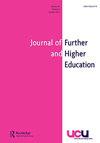Academic reputation quality and research: an analysis of Latin-American universities in the world higher education institution rankings from the perspective of organizational learning theory
IF 2.3
Q1 EDUCATION & EDUCATIONAL RESEARCH
引用次数: 0
Abstract
ABSTRACT The purpose of the research is to theorise about the determinants of academic reputation and the moderating effects of aspiration performance in Latin-American universities present in three of the most important rankings in the world: The Times Higher Education, QS World University Rankings, Academic Ranking of World Universities (ARWU). To achieve the research purpose, a time series panel is performed. Our general model trying to evaluate the effect of aspirational performance 15 on the relationship between Faculty quality (Research and Teaching) and Academic Reputation in Latin American Countries was specified. The database considered in the research includes the universities classified in the Times Higher Education ranking (THE), QS World University Rankings (QS), and Academic Ranking of World Universities (ARWU) from 20 2011 to 2022. Concerning the results, it was possible to verify that the ranking of performance in research and the ranking of performance in quality does not have a significant relationship with academic reputation. While ranking performance in quality and research according to the category of countries, a positive and robust impact was observed. 25 Similarly, it was found that the regions’ moderating effect on the relationship between quality and research and its impact on the academic reputation of higher education institutions. As a general conclusion of the article, it is possible to show that regional dynamics of the location of university institutions define the strategy from which the institution’s 30 performance is improved. Therefore, the importance of the influence of environmental actors on performance is identified.学术声誉质量与研究——基于组织学习理论的拉美大学世界高等教育排名分析
摘要本研究的目的是对世界上三个最重要的排名中的拉丁美洲大学的学术声誉的决定因素以及抱负表现的调节作用进行理论分析:《泰晤士报高等教育》、QS世界大学排名和世界大学学术排名。为了达到研究目的,进行了时间序列面板。我们试图评估抱负表现15对拉丁美洲国家教师质量(研究和教学)与学术声誉之间关系的影响的通用模型已被指定。研究中考虑的数据库包括2011年至2022年《泰晤士报》高等教育排名(The)、QS世界大学排名(QS)和世界大学学术排名(ARWU)中的大学。关于结果,可以验证研究绩效排名和质量绩效排名与学术声誉没有显著关系。在根据国家类别对质量和研究业绩进行排名的同时,观察到了积极而有力的影响。25同样,研究发现,地区对质量与研究之间关系的调节作用及其对高等教育机构学术声誉的影响。作为文章的一般结论,可以表明,大学机构所在地的区域动态决定了提高该机构30年绩效的战略。因此,确定了环境行动者对绩效影响的重要性。
本文章由计算机程序翻译,如有差异,请以英文原文为准。
求助全文
约1分钟内获得全文
求助全文
来源期刊

JOURNAL OF FURTHER AND HIGHER EDUCATION
EDUCATION & EDUCATIONAL RESEARCH-
CiteScore
5.20
自引率
4.30%
发文量
80
期刊介绍:
Journal of Further and Higher Education is an international, peer-reviewed journal publishing scholarly work that represents the whole field of post-16 education and training. The journal engages with a diverse range of topics within the field including management and administration, teacher education and training, curriculum, staff and institutional development, and teaching and learning strategies and processes. Through encouraging engagement with and around policy, contemporary pedagogic issues and professional concerns within different educational systems around the globe, Journal of Further and Higher Education is committed to promoting excellence by providing a forum for scholarly debate and evaluation. Articles that are accepted for publication probe and offer original insights in an accessible, succinct style, and debate and critique practice, research, theory. They offer informed perspectives on contextual and professional matters and critically examine the relationship between theory and practice across the spectrum of further and higher education.
 求助内容:
求助内容: 应助结果提醒方式:
应助结果提醒方式:


